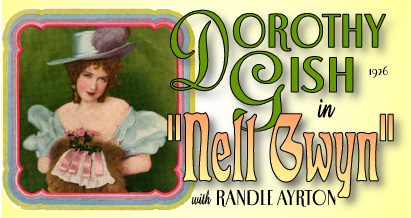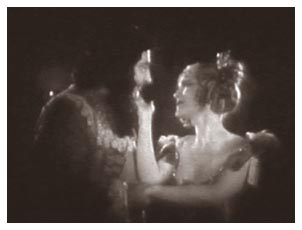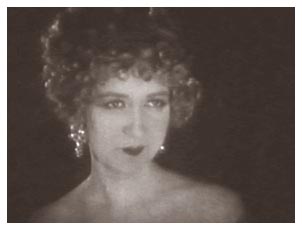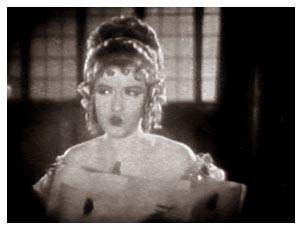

Produced by British National Films
Directed by Herbert Wilcox
New York Premiere July 18, 1926
Cast: Dorothy Gish (Nell Gwyn), Randle Ayrton (King Charles II),
Juliette Compton (Lady Castlemaine), Sydney Fairbrother (Mrs.
Gwyn), Donald Macardle (Duke of Monmouht), Johnny Butt (Samuel
Pepys), Gibb McLaughlin (Duke of York), Judd Green (Toby Clinker),
Edward Sorley (Dickon), Forrester Harvey (Charles Hart), Fred
Rains (Earl of Shaftesbury), Rolf Leslie (Evelyn), Aubrey Fitzgerald
(Tom Killigrew), Tom Coventry (Innkeeper), Booth Conway (Messenger)
"Nell Gwyn" is a long awaited and welcome addition to the home video market, thanks to Grapevine Video's recent release. More about that later, but, first, let's talk about the production.
"Nell Gwyn" is a good story with an outstanding performance by Dorothy Gish - without whose presence the film would probably be forgotten today. The real Nell Gwyn was known for her humor and quick wit, and director-producer Herbert Wilcox builds the whole persona of the heroine around that characteristic - not only making Dorothy Gish a perfect choice for the part, but bringing a likableness to, let's say, a less than virtuous character.
And what's not to like. Yes, Nell Gwyn is the mistress of
the king - a part some may be surprised to find a Gish portraying,
while others may say, "So what?" - yet any moralistic
attitude toward the character of Nell Gwyn is quite overshadowed
by it being a fairy tale-type love story of an impoverished girl
finding herself living in a castle. Wilcox most  certainly
diverted the censors by portraying Nell Gwyn as being deeply in
love with the King - in spite of the fact that she reluctantly
tolerated a second mistress (of course, the real King Charles
II had several).
certainly
diverted the censors by portraying Nell Gwyn as being deeply in
love with the King - in spite of the fact that she reluctantly
tolerated a second mistress (of course, the real King Charles
II had several).
The film no doubt also benefited from the sexiness of the part, immediately conveyed in the opening scene when Nell is dancing in her impoverished surroundings, almost a rag of a blouse very low cut and dangling from one shoulder. One can't help but wonder how many times Gish may have actually exposed herself during the filming since the it's hard to believe she could have done such a lively dance in such little covering without that occurring at some point. Neverthess, low cut attire is a standard in the film with Nell's rival, Lady Castlemaine, in 1600's period costume appearing to dip as low as possible without exposing more than it should. Both Gish and Juliette Compton (Castlemaine) tug at their bodices teasingly several times throughout the film - but, then again, the film portrays what supposedly is the morality of the aristocracy of the 1600's - or at least as we are to understand it 400 years later.
The story, admittedly, is not a strong one. Nell is from poverty and sells oranges at the local theatre. The King sees her, develops a relationship, and then invites her to be one of his "favorites" at the Palace of Whitehall. Now, a good story needs strong conflict and a nemesis that will stir our emotions. "Nell Gwyn" provides only a small dose of either of these. We are introduced early to James, the Duke of York, Charles' brother and heir to the throne - along with his cohort, the Earl of Shaftesbury. Both are very sour-looking, so we assume there is foul play afoot - but that never happens. Throughout the film, James simply looks very seriously and disapprovingly at all of Charles' and Nell's antics but never poses any threat to them. Lawrence Anderson, who portrays James, certainly looks the part with his long-faced grimacing, but, unfortunately, he is never given the opportunity to truly act.
The most arresting performance comes from Juliette Compton as Lady Castlemaine, Charles' other "favorite." She, in contrast to Nell, is very aristocratic and haughty - and extremely jealous of Nell. The conflict comes to a head when Nell is snubbed by everyone at the ball in favor of Lady Castlemaine. It appears a large hat is a "turn on" in 17th Century aristocracy, and Lady Castlemaine is successful in taking away Charles' attention with a newly-made, rather large hat. The next evening, in her performance at the theatre - attended by Charles and Lady Castlemaine (wearing her new hat) - Nell comes out in a ridiculously large hat that must be five feet wide - walks over to the King's box and mocks Lady Castlemaine. Of course, Lady Castlemaine is appalled and turns her back on the stage. The entire audience knows the situtation and laughs uproariously. Nell is a hit!
Afterwards, at Whitehall, Lady Castlemaine and Nell have a confrontation where Compton (Castlemaine) give an outstanding and vitriolic performance. Wilcox shoots directly into Compton's face to give the viewer Nell's perspective while Castlemaine spews forth venomous insults and threats. The rage in her facial expressions is intimidating, disturbing and even a little fearsome. Although Nell looks as if she may cower for a moment by this, she comes back with even greater force, lambasting Lady Castlemaine, placing her face right in her rival's and poking her in the chest as she pushes and orders her out of the room. It's a moment to cheer! However, after Lady Castlemaine leaves the room, it is appropriate that Wilcox shows up the softer side of Nell as she sits on the bed, pulls out her handkerchief and cries.
With Charles' health failing, we know his death is imminent,
and, of course, the question is, "How will she be treated
by James once he assumes the throne?" This scene begins as
Nell excitedly prepares for the day's celebration - not only her
birthday, but the day the King will name her Countess of Greenwich.
However, as she is celebrating, her  lady-in-waiting
runs into the room to tell her the King is dying. Dorothy Gish's
performance through the remainder of the story is as good as any
captured on film. She runs to his bedside, kneels beside him,
and holds his hand against her face as she cries. Appropriately,
though, he wants to hear her laugh once more before he dies, and
Gish's emotions as she alternately cries and forces her laugh
are heart-wrenching. And, when the King dies, Wilcox doesn't show
his passing with a shot of his face. We see his passing as the
hand against Nell's face goes limp - much more effective, because,
as it should be, the viewer is focused on Nell. She is grief-stricken
- feels the warmth of life leaving his hand and breathes on it
to warm it - all to no avail. No viewer can help but be moved
by so powerful a scene.
lady-in-waiting
runs into the room to tell her the King is dying. Dorothy Gish's
performance through the remainder of the story is as good as any
captured on film. She runs to his bedside, kneels beside him,
and holds his hand against her face as she cries. Appropriately,
though, he wants to hear her laugh once more before he dies, and
Gish's emotions as she alternately cries and forces her laugh
are heart-wrenching. And, when the King dies, Wilcox doesn't show
his passing with a shot of his face. We see his passing as the
hand against Nell's face goes limp - much more effective, because,
as it should be, the viewer is focused on Nell. She is grief-stricken
- feels the warmth of life leaving his hand and breathes on it
to warm it - all to no avail. No viewer can help but be moved
by so powerful a scene.
The film ends as we see James outside the bedroom declared King - still stolid and expressionless as he has been throughout the film. When Nell emerges from the bedroom, she says, "The King is dead. Long live the King!" Those around James kneel to kiss his hand. Nell gathers herself and walks upright toward James as he holds out his hand for her to kiss, as well. Without glancing toward him, she walks right past. There will never be but one King for her.
Although the story ends here, we know from history that James continued to provide income for Nell until her death - a wish that Charles had conveyed to his brother before his death. However, the film's conclusion leaves it is unclear as to what her future held.
There is more than a moderate amount of historical accuracy to the film since it is based on the 1926 novel "Mistress Nell Gwyn" by Marjorie Bowen, and, as with any biographies of Nell Gwyn, is helped from personal recollections found in Samuel Pepys famous diary from the 1600's - who also had the opportunity to watch her perform on stage several times. One minor incident, which is supposedly based on historical fact, has the King invite Nell out to dinner after meeting her at the theatre. "Charles invited Nell and her escort to supper, along with his brother James, Duke of York. The anecdote turns charming if perhaps apocryphal at this point: the King, after supper, discovered that he had no money on him; nor did his brother. Gwyn had to foot the bill. 'Od's fish!' she exclaimed, in an imitation of the King's manner of speaking, 'but this is the poorest company I ever was in!'" (1) The phrase "Od's fish!" is also used several times throughout the film.
It is historically accurate that Nell had a rival (one of Charles' many mistresses) for much of her time in Whitehall. Lady Castlemaine is Barbara Palmer whose "influence was so great that she has been referred to as 'The Uncrowned Queen.'" She also bore five children by Charles. (2) The portrayal of Nell selling oranges at the theatre is also historically accurate. What the film doesn't tell us is that Nell's past likely included being a prostitute and having several affairs before King Charles. It also doesn't tell us that she had two children by Charles and, less than three years after Charles' demise, died "almost certainly due to the acquired variety of syphilis" (3)
Made by British National Films, the cast is not surprisingly all English with the exception of Gish. As noted, Compton gives an outstanding performance as Lady Castlemaine, and Randle Ayrton is affable and perfectly suited for the role of King Charles II. Contemporary reviews were universally positive, especially for Dorothy Gish's performance - even though the reviewers seemed to be giving somewhat of a backhanded compliment for a film of this quality coming out of England.
For example, the New York Times reviewer said, "Whatever
may be the shortcomings of English motion picture producers, if
they can put together other pictures as simply and with  as much dramatic effect as this story of Nell
Gwyn, they should have no difficulty obtaining a showing for them
anywhere. The story moves quickly and surely. With nothing to
strain one's credulity, and the acting of Miss Gish and Randle
Ayrton, who takes the part of Charles, is excellent. So is that
of Juliette Compton as Lady Castlemaine. The immorality of the
period is suggested without being offensive, and for the second
time this summer a good picture has not been spoiled by prudery.
The titles are unusually good and frequently amusing, that deal
of gossip Pepys being restored to for purposes of verisimilitude."
(4)
as much dramatic effect as this story of Nell
Gwyn, they should have no difficulty obtaining a showing for them
anywhere. The story moves quickly and surely. With nothing to
strain one's credulity, and the acting of Miss Gish and Randle
Ayrton, who takes the part of Charles, is excellent. So is that
of Juliette Compton as Lady Castlemaine. The immorality of the
period is suggested without being offensive, and for the second
time this summer a good picture has not been spoiled by prudery.
The titles are unusually good and frequently amusing, that deal
of gossip Pepys being restored to for purposes of verisimilitude."
(4)
Harrison's Reports' reviewer had much the same praise. "If England can produce pictures like this one, the Britishers need not worry about breaking into this market; the market will open its arms to receive them. 'Nell Gwyn' is as well produced as any American picture; Mr. Herbert Wilcox has shown intelligence in producing it. The spectator becomes interested deeply in what is unfolded, and he is amused greatly by the various incidents showing a battle of wits between Nell and Lady Castlemaine. The incident on the stage, in particular, where Nell caricatures the large hat of Lady Castlemaine by wearing a hat of immense proportions is extremely amusing. Miss Gish makes an excellent Nell Gwyn; her pantomimic ability fits her for the role extremely well. Although Nell is a mistress (of King Charles II), she is so human that she wins the spectator's sympathy and admiration. There is a great deal of pathos in the closing scenes, where the death of the King is shown. Nell's refusal after the death of the King to kiss the hand of King James shows admirable character. The acting of all the players in the cast is faultless. The good settings help produce an atmosphere of realism." (5)
Sister Lillian Gish was working at MGM while Dorothy was in England filming "Nell Gwyn" and found herself less in control of her films. While working on her latest production, she wrote to Dorothy of her discouragement. Dorothy responded, "Your story is all right, which, I am sorry to say, is more than I feel about the one I am doing." However, Dorothy obviously changed her opinion of the production, because she later referred to Nell Gwyn as her "favorite part." (6)
As noted at the beginning of this commentary, much praise is due to Jack Hardy at Grapevine for bringing this great movie to home video. The picture quality, unfortunately, isn't a 10 out of 10 since a bit more sharpness and contrast is desired. The original tints and tones, as well as intertitles, are there, though, making for a nice viewing as it was in 1926. The score is credited to Christopher Congdon and boasts an excellent period-appropriate orchestral score with perfect timing for scene changes and mood setting. The score will certainly please!
References:
1. "Barbara Palmer, First Duchess of Cleveland." Wikipedia.
2. "Nell Gwyn." Wikipedia.
3. Bax, Clifford. Pretty Witty Nell. Benjamin Blom: New
York/London. 1969.
4. "Nell Gwyn" review. New York Times. July 19,
1926.
5. "Nell Gwyn" review. Harrison's Reports. July
31, 1926
6. Afron, Charles. Lillian Gish: Her Legend, Her Life.
Scribner, 2001.
Copyright 2014 by Tim Lussier. All rights reserved